Il Viaggio a Reims
King Charles’ Coronation, The Opera
Il Viaggio a Reims
by Gioachino Rossini, libretto by Luigi Balocchi
English Touring Opera at the Hackney Empire until 4th March, then on tour until 29th May
Review by Mark Aspen
With the anticipation building towards this spring’s coronation of King Charles, it is quite a coup to put on an opera about (and commissioned for) the coronation of King Charles. English Touring Opera’s perambulations around the country take it to Cheltenham on 6th May, Coronation Day. And what a glorious and exuberant way for the fortunate townspeople of this genteel spa to celebrate such an historic occasion.
However, the opera in question, Rossini’s Il viaggio a Reims is not about May 2023 and the coronation of our own King Charles III, but about the coronation of the restored French monarch, King Charles X in May 1825. But let’s not allow a mere 198 years spoil a good opening to a review.
Coronations do not happen very often (our last one was seventy years ago), so it is not surprising that very few operas have been written to celebrate coronations. Neither is it surprising that Rossini did not expect it to have much of a shelf life. The opera was especially commissioned by the French court and premièred three weeks after the coronation. Il viaggio a Reims hadthree more performances. Rossini then promptly binned it … then pulled it out the bin, and put it in the recycling. Three years later much of it re-appeared in Le comte Ory. By then his libretti had swapped from Italian to French.
Il viaggio a Reims is, a the name suggests, about a journey to Rheims. The travellers are a group, mainly of aristocrats, who are on their way to Rheims for the King Charles X’s coronation. They never get there.
The opera is really just a series of anecdotes, sketches to show off some of Rossini’s most accomplished music and his most sparkling operatic singing opportunities.
The motley group are stuck at The Golden Lily hotel in the spa town of Plombières-les-Bains, in the Vosges Mountains towards the Swiss border, some two hundred miles from Rheims. With a heavy demand for horses at this time as everyone has been planning to get to the coronation, they are at the back of a long waiting list. All perhaps is not lost as they hear that the King will return to Paris after the coronation, where one of their number, the Contessa di Folleville has a mansion. Everyone can come to her after-show party. But that is a further one hundred miles beyond Rheims. (Geography is not a strong point with this group.)
So, stranded, they spend their time in romantic intrigues, amorous adventures, and related oh-so-French pursuits in various parts of the hotel.
Right at the beginning of the opera, the hotel proprieties Madame Cortese has been geeing up her staff, urging them to present the hotel as the very best, in the hope that these wealthy guests might stay on a regular basis. Her preening, sprucing and titivating of her establishment pays dividends, as the group decide to blow the money they would have spent at the coronation on a blow-out banquet at the Golden Lily.
Rossini was himself having a blow-out extravaganza with his royal commission of this dramma giocoso. He was able to engage the best singers of his time, including Giuditta Pasta, the Maria Callas of her time, in the role of the poetess, Corinna. He indulged himself with eighteen main named roles, most of whom have solos, giving them plenty of none-too-easy bel canto gymnastics. Moreover, Rossini wrote an extravagant score for a plethora of instruments.
Conductor Jonathan Peter Kenny proves an excellent interpreter of the score, with the period-instrument musicians of the Old Street Band lending radiant delicacy to Rossini’s score. The touch may be light, but occasionally the scale of the work does miss the full heft of the old ETO Orchestra. The music excels in its more reflective moments, as in Aileen Henry’s exemplary harp solo that introduces Corinna’s reconciliatory aria, Arpa Gentil. Music hath charms and it soothes the two quarrelling rivals for the affections of the widowed Marchesa Melibea, the Russian general Conte di Libenskopf, and the ardent admiral, the Spanish nobleman Don Alvaro. Mezzo-soprano Esme Bronwen-Smith plays the Marchesa with assured self-possession as the supremoes of army versus navy war for her attentions, tenor Julian Henao Gonzalez a sturdy Libenskopf, and Jean-Kristof Bouton’s rounded performance as the volatile Don Alvaro
This hotbed of diverse amorous entanglements becomes well dug-in is as the lack of horses and coaches becomes endemic. The fun of fair arises from all the petty dramas, starting with the “end-of-the-world” faint when the fastidious fashionista the Countess of Folleville learns that the coach carrying her finery has overturned en route. Partir, o ciel! desio’ and she faints. She is a wealthy young widow and needs to make an impression at the coronation.
Soprano Luci Briginshaw’s sparkling singing portrays the frivolity of the Countess. One bonnet has been rescued, Ah! Quel sorpresa!
Chevalier Belfiore, a young French officer, has accompanied Countess of Folleville, but he has eyes on Corinna, and in a surprise encounter he praises her “divine form” (he is also an amateur artist), Nel suo divin sembiant. Richard Dowling’s effective lyrical tenor has a youthful quality as Belfiore. A more serious suitor for Corinna is an English nobleman Lord Sidney. He is quite reticent to express his longing for her, “in vain I tear at my heart” he sings, Invan strappar dal cuore. Edward Hawkins’ rich bass and tall stature adds a wonderful gravitas to the role.
An image is used in the opera of Corinna being metaphorically caged by the men who pursue her. Nevertheless, Susanna Hurrell bring a warm sensitivity to the role of Corinna, and her beautiful soprano voice is superb.
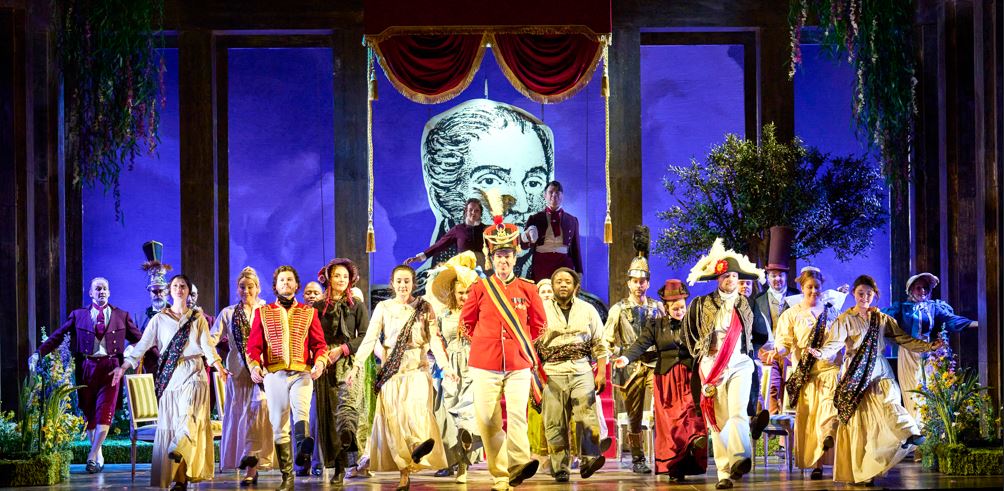
The bulk of the final act is given over to the big party, completed with singing and dancing and motley entertainments. Then all the principals do a “turn”. Rossini has musical fun, overtly poaching the tunes that sum up national characteristics, and ETO goes along with this idea with gusto. So we have pastiches of national anthems. The music-loving major, Baron Trombonok sings the German national anthem, Haydn’s Kaiserhymne, Grant Doyle’s strong bass making quite an impression. Of course Lord Sidney recites God Save the King. However, the French Marseillaise is not sung, for it was forbidden as revolutionary during the France’s brief restoration that was marked by this coronation of King Charles X. Instead Chevalier Belfiore and Countess Folleville sing in duet a traditional French folk song, in praise of the Duchesse de Berry, a great patron of the arts. Then a bucolic folk song from the Tyro is contributed by the hotelier Madame Cortese, Lucy Hall’s silky soprano and another of the guests Don Profondo, Corinna’s eccentric antiquarian friend, superbly sung by bass Timothy Dawkins. Corinna herself has to be rather cajoled into her party piece. The other guests all suggest a subject for her, lots are drawn, and out, surprise, surprise comes “Charles X, King of France”.
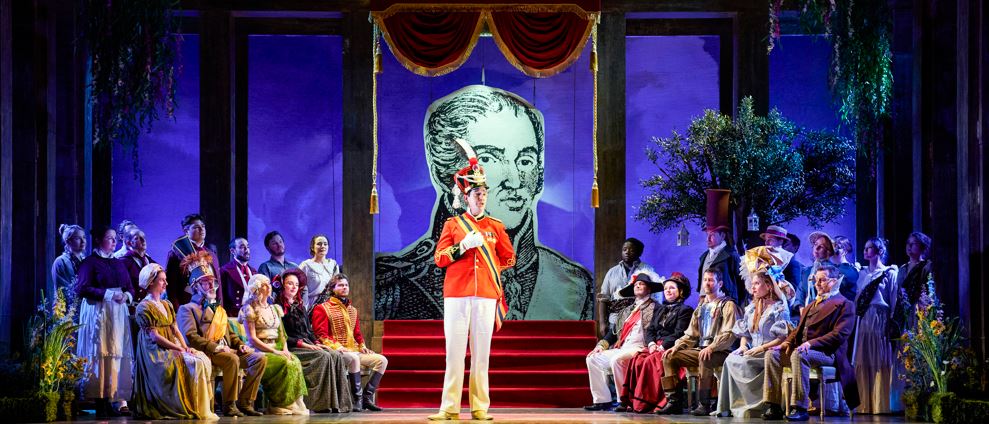
With all this national stereotyping, Rossini and Balocchi probably would not be able to write this opera today, at a time when a pub’s golliwogs are arrested by posses of police. Moreover, at the beginning of the opera the bookish Don Profondo observes the luggage of his travelling companions, pointing out the how the contents epitomise each nation’s character. It’s great harmless fun, and provides much sport for the props department. It is good to see ETO talking this so fearlessly.
The set for Il viaggio a Reims is remarkable. Designers Adam Wiltshire and Cordelia Chisholm, together with lighting designer Ric Mountjoy, have created a picture of luminous, almost translucent, precision, which paradoxically is both vivid and pastel. It is populated by Adam Wiltshire’s period perfect and equally colourful costume designs. There are some self-deprecating visual gags, such as the unavailable carriage and horses being conjured up from the waiting stash of luggage and umbrellas. Topping this visual comment on their transportation dilemma is a wonderful coup de théâtre, when by scrolling down the backdrop, it appears that the whole hotel is flying off to Paris courtesy of a hot-air balloon, initially seen at toy size.
All this presentation chimes with the delicate and lightly ironic tone, which director Valentina Ceschi so skilfully builds. The whole production becomes a metaphor for travelling hopefully. She has remained largely faithful to Rossini, although having the final coronation scene disrupted by a dissident republican did come out of nowhere and marred the atmosphere so carefully built.
The opera ends with a chorus, Viva il diletto augusto regnator (long live our beloved noble monarch). The finale is robust, rousing and reassuring.
It also sounds very familiar. May it be that in Cheltenham and in London, nearly two centuries later, on 6th May all our people can sound out … God save King Charles!
Mark Aspen, March 2023
Photography by Richard Hubert Smith

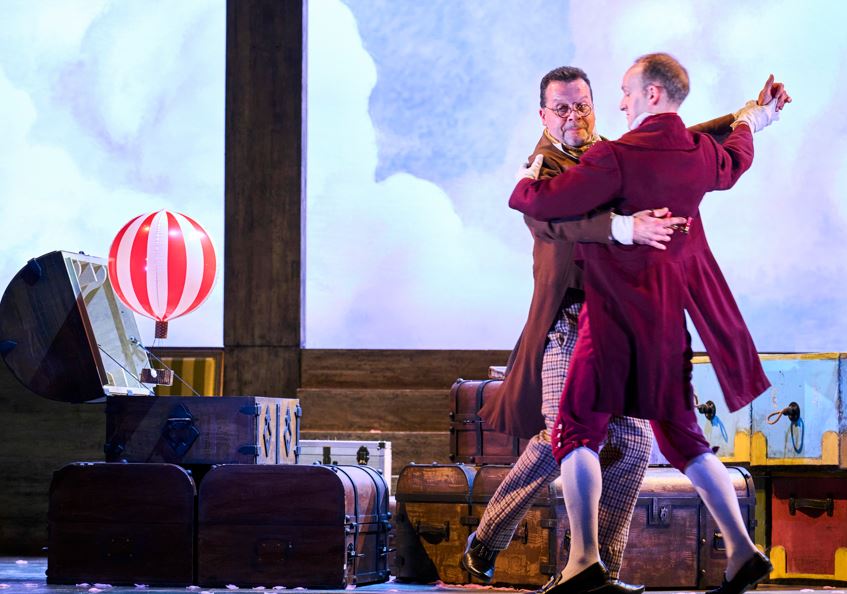
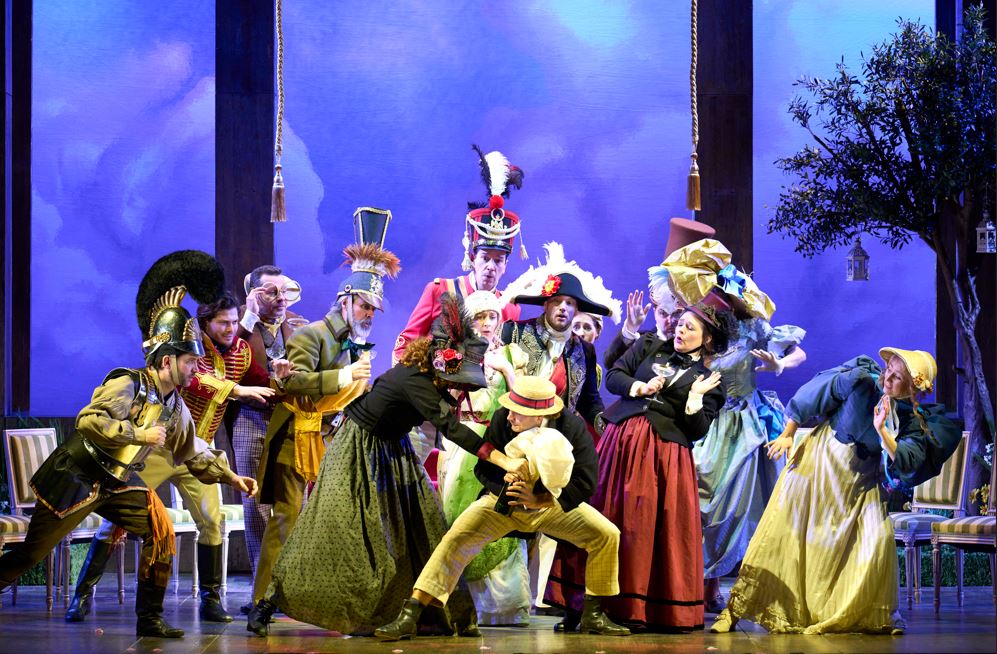
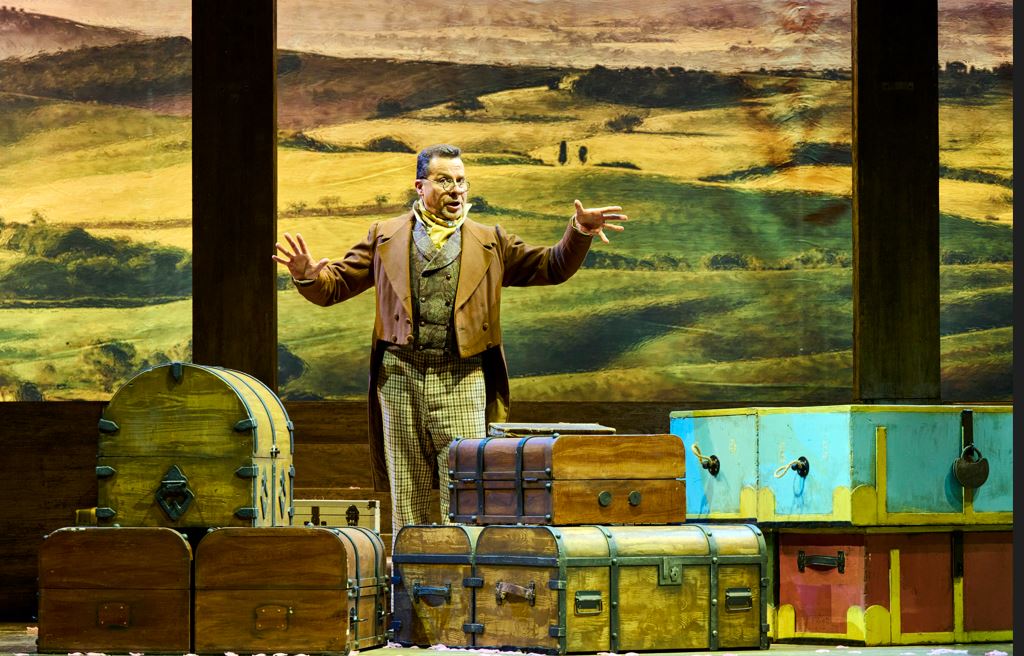
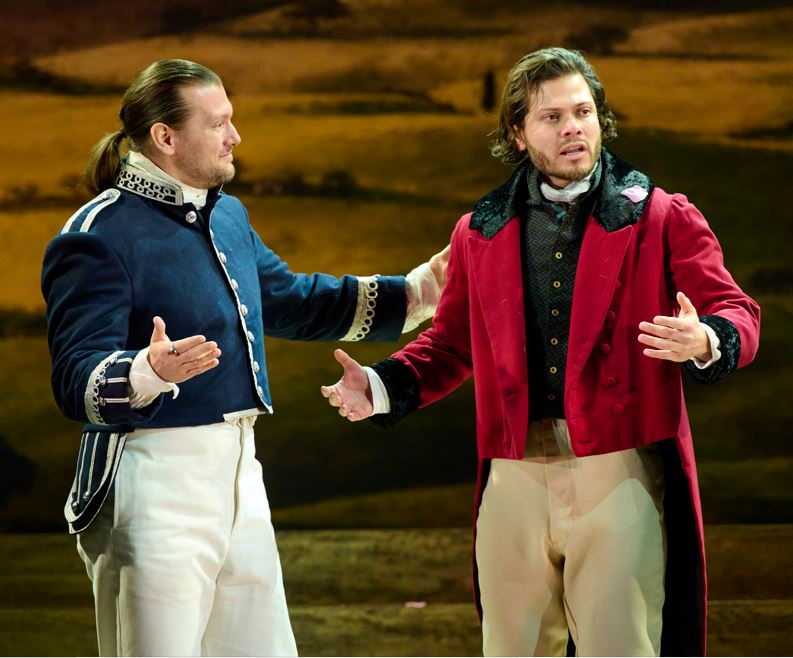
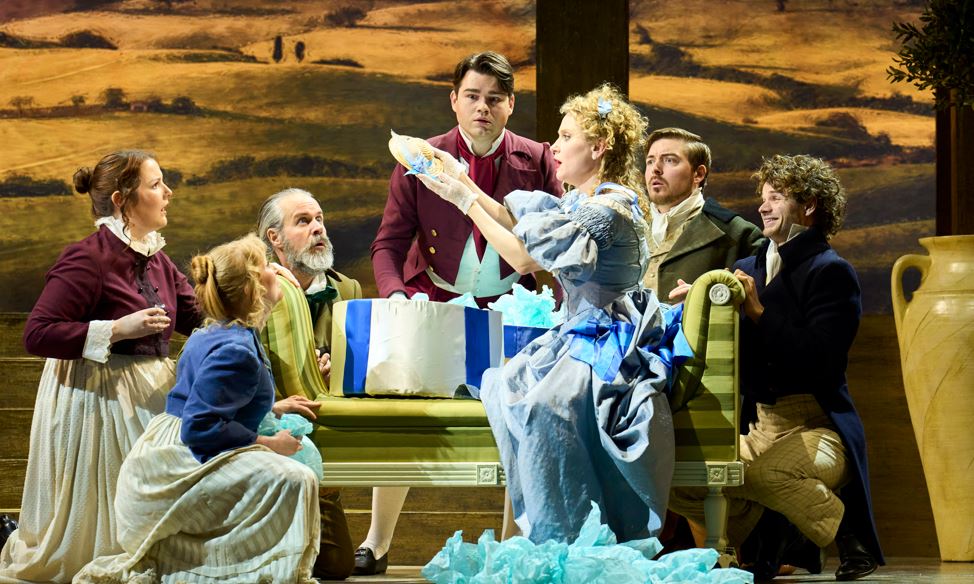
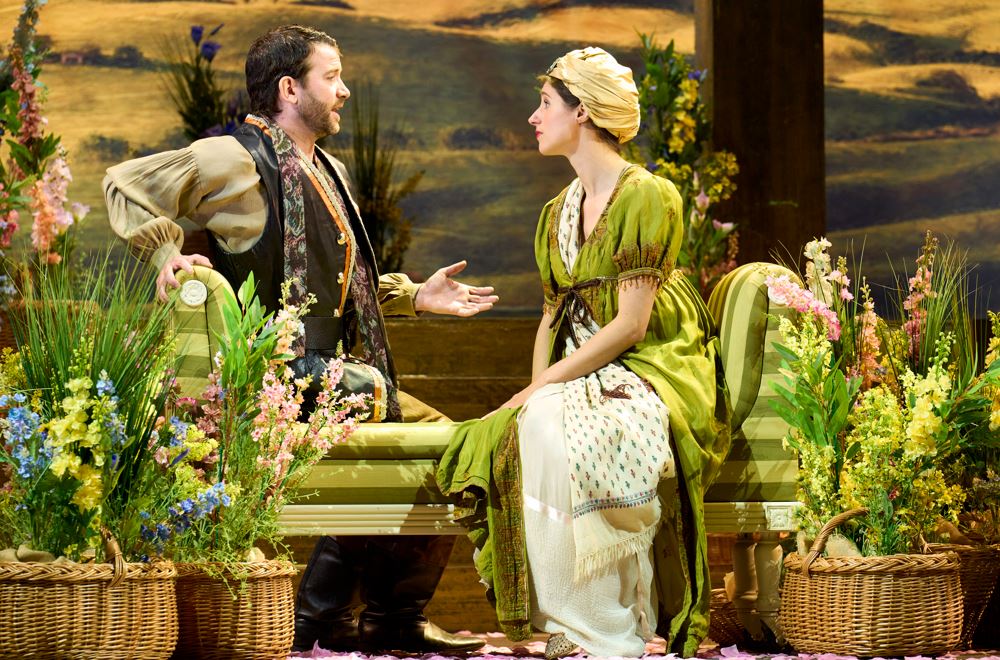
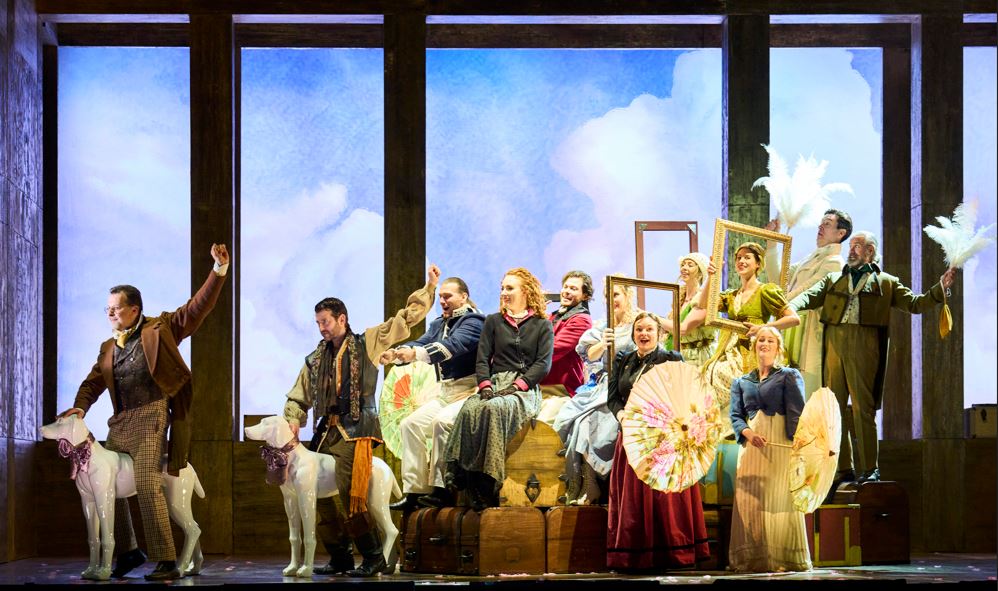
Trackbacks & Pingbacks